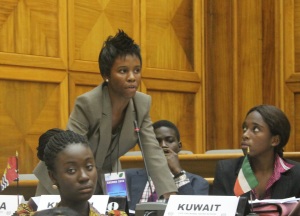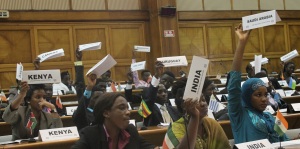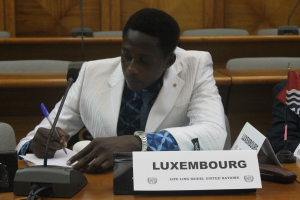In Model UN, we have a crisis when a committee is presented with a difficult situation that threatens peace and security of the world or region. Oftentimes, this crisis needs immediate action to salvage the situation. With that said, what happens when an MUN delegate is in crisis? What happens when you get to the committee and realize you have lost your prepared speech? How do you cope when you realize your allies have turned against you overnight? What do you say in committee when you suddenly realize “you have nothing more to say”? What do you do to get the chairperson to call on you to speak?
1. You get to the committee room and realize you have lost your speech. Find it there in the room.
Need I say that it is very frustrating when you have encountered several sleepless nights in to prepare a speech, only to realize that you do not have the speech in your folder. First, if you are unlucky to have your name so early on the speakers list, you would have to appeal to the rules of procedure that allow you to move your name to the end of the list. You could write a request note to the chair, seeking your name to be moved to the end of the speakers list. This will help you buy enough time to execute your “Plan B” of preparing your speech right there in the committee. Now that your country is lagging at the bottom of the list, begin to listen attentively to all the speakers on the list before you. Their speeches will become the source of your speech. Pay particular attention to the delegates that are in your regional bloc; their positions should remind you of your own. Take down notes of every statement that reminds you of your own that can safely agree with your country’s position. Do not risk including any issues of controversy and use as many pointers needed to plan out your speech. If you draft your speech in committee last-minute like this, don’t worry about the length of your speech, as you will have enough time to pace out your delivery. If you still have extra time after your speech, yield your time, but avoid yielding to the chair. Yield to questions. That way, you won’t come off as an unprepared delegate and you would have a higher chance of making more impact with your time on the speakers list than you would have made with your original. In conclusion, I hope you don’t lose your speech, but if you do, you could find a substitute right there in the committee.
2. You are in the middle of your speech in a moderated caucus and realize; you are stuck.
I have always held the view that any delegate who rises to speak should be mindful of a possible choking. But when you choke, remember you are not the only delegate entitled to speak on that matter. Secondly, you are entitled to yield your time to another delegate who could add up to what you have said. MUN delegates should always have in mind a list of individuals that will save them in times of such crisis. When you have lunch, breakfast or supper, make sure you identify a delegate who can do this and….accepts to do this. The last thing you or any other delegate would want is being ambushed to make a speech when they are not ready. So when you say: “Honorable chair, I wish to yield my time to the delegate from Ghana to make some additions,” be sure to make it as smooth and natural as possible by making an introduction that suggests that you have the same line of thinking with that delegate. This way, it is not an afterthought but a well-planned relay.
3. You wake up the next morning to realize you have lost your sponsors (allies)

4. When you realize that everyone is picking on you in committee
Well, you might enjoy the thought of being the center of the committee. But when it is for the wrong reasons, you would most definitely not relish it. In many of the middle and high school Model UN conferences I have supervised, I have witnessed delegates who break down in committee or refuse to attend the next day’s conference because they were bombarded with questions or criticisms about a statement they made. Usually, these delegates try, without success, to defend themselves. What I have, however, realized is that junior high and senior high school delegates enjoy picking on their counterparts who seem to be in difficult situations; they also enjoy seeing other delegates struggle to defend themselves. Hence, if you ever find yourself between the poles under such circumstances, the safest bet to get yourself out is to get someone else to take the fire. In your response, refer to another controversial statement by someone else in the committee. In doing this, you increase the chances of shifting attention from you to that delegate, or the other or yet, another. Keep referring and diverting until you get to the relief you seek. Some MUN colleagues have suggested you could move for an unmoderated caucus which may diffuse the tension and allow you time to re-organize and crosscheck your facts. My response to that is good luck, but I doubt that teenage delegates would vote for a motion to skip a delegate showdown/rapid-fire debate for a disorganized unmoderated caucus.
5. When you seem not to be noticed by the chair…..use a ‘unique’ placard




